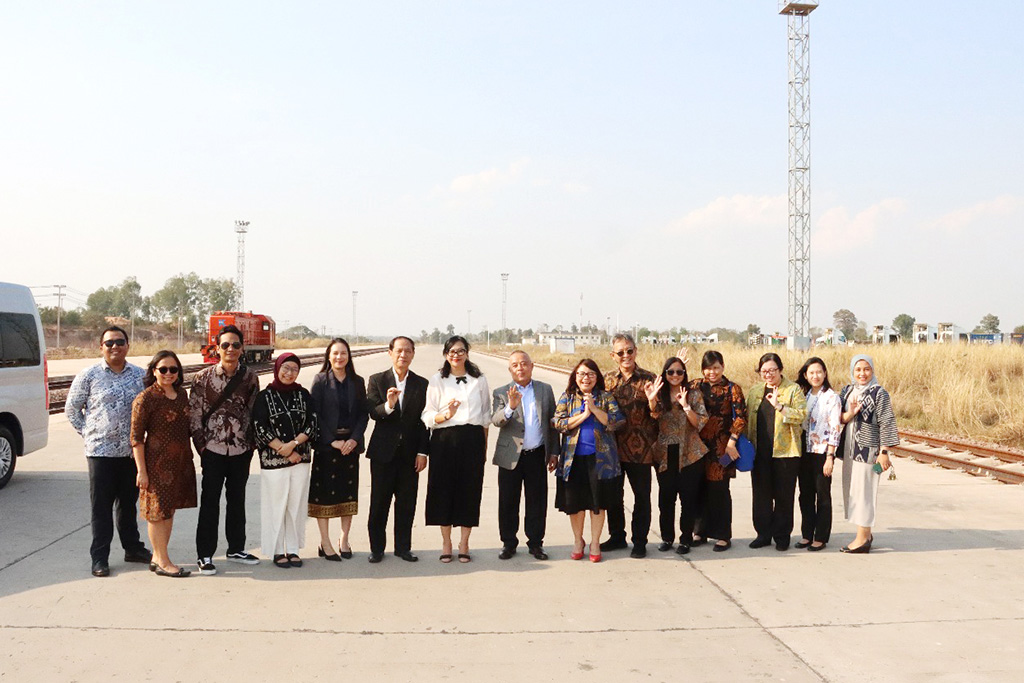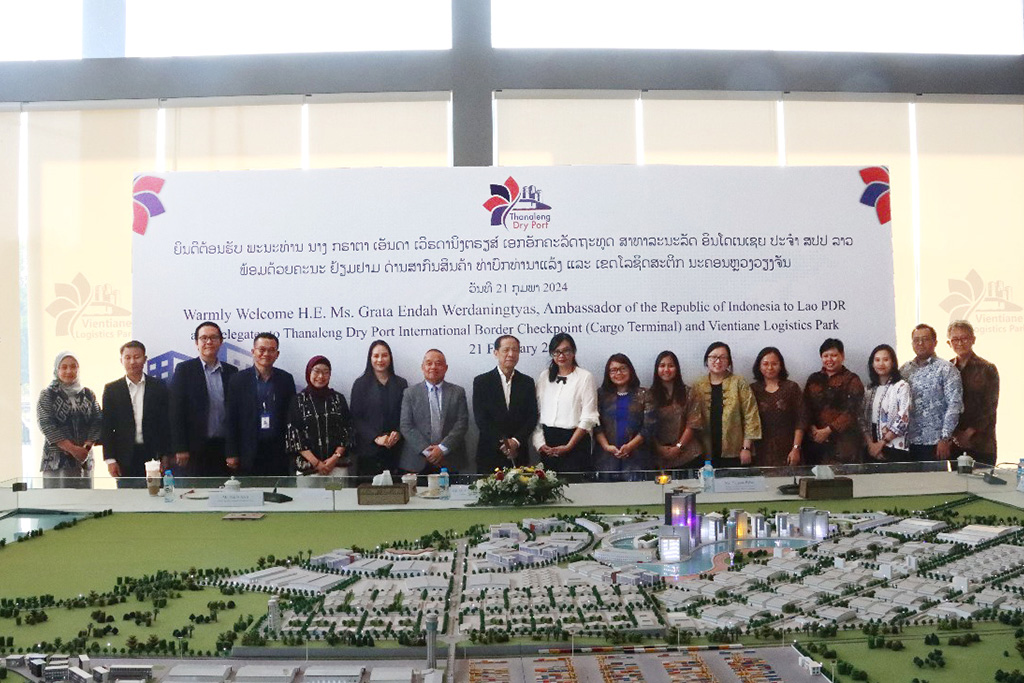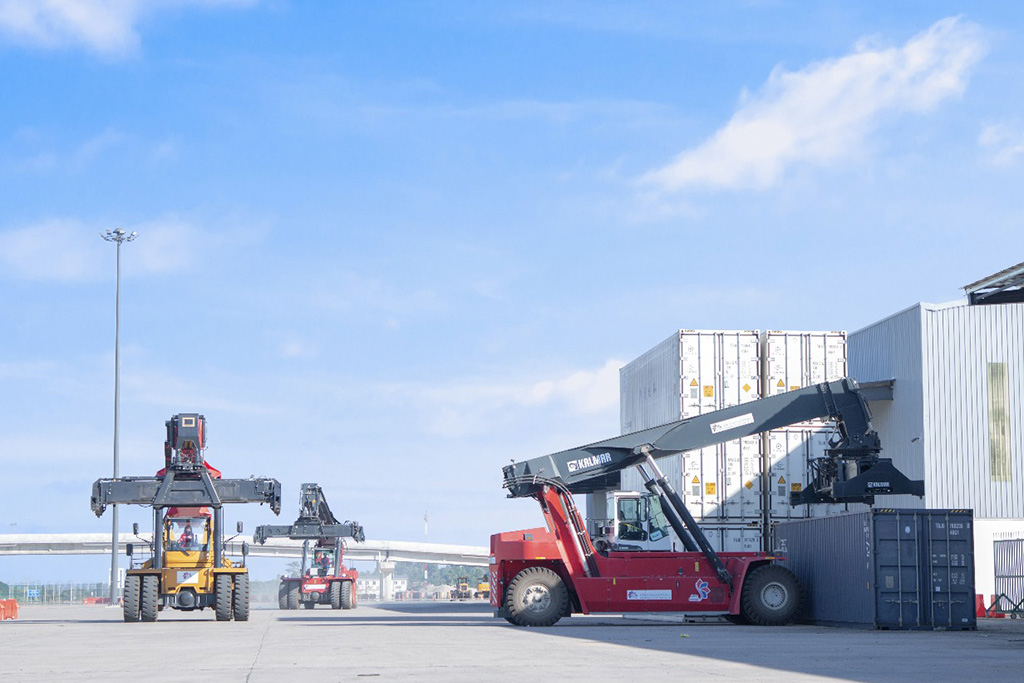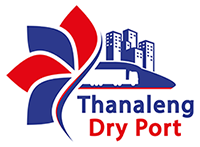
Thanaleng Dry Port ‘an opportunity for Indonesian investors
Thanaleng Dry Port and the associated Vientiane Logistics Park offer numerous opportunities to Indonesian investors, thanks to their growing logistics interconnection, the developer of the venture has told Indonesian diplomats and delegates.
Located in Vientiane, this integrated logistics centre of Laos hosts a transshipment area where the Laos-China and Laos-Thailand railways converge and form a crucial part of a rail-road-sea trade route that links Southeast Asia to other regional and global markets.
From the dry port, a customs clearance point for rail freight transport, trains will cross the Mekong river to Thailand and can reach Malaysia, the Managing Director of the dry port, Mr Sakhone Philangam, told the Indonesian Ambassador to Laos, Ms Grata Endah Werdaningtyas, and members of a delegation that accompanied her.

The Lao dry port’s operator has signed a Memorandum of Cooperation with the Malaysian operator of Perlis Inland Port, seeking to reach the Andaman Sea. From there, cargo could be moved to Sumatra Island, Indonesia.
“From there, Sumatra is very close,” he said, adding that it is shorter than other routes.
The Lao dry port and Vientiane Logistics Park are crucial components of the Lao Logistics Link project, being developed by PTL Holding Company Limited in partnership with the Lao and Vietnamese governments.
The project includes Vung Ang seaport in Vietnam’s central Ha Tinh province, a planned railway linking the seaport to Thanaleng Dry Port, and a dry port and a planned coal-fired power plant in central Khammuan province through which the railway will pass.
Once the project is fully realised, the Lao investor plans to import coal from Indonesia through Vung Ang Port and the railway to feed the power plant, and this route will also be used to export potassium from Khammuan.
“That is in the pipeline,” Mr Sakhone told the guests.

To tap the trade and investment potential created by the interconnection, the Lao investor is also developing the US$547-million logistics park to attract foreign investments. The park includes an export processing zone, a logistics park, a free trade zone, and a technology and halal hub, which can be an area of opportunity for entrepreneurs from Indonesia – a major market for halal food.
The under-construction export processing zone, connecting with the Laos-China Railway, boasts of great potential as manufacturers can easily access the Chinese market through a cost-effective transport service. And through the China-Europe rail network, cargo can even reach Germany via Kazakhstan, Russia, Belarus and Poland, taking much less time than transportation by sea.
In addition, investors in Laos will benefit from a number of incentives, including a corporate tax holiday of eight to 16 years and lower Value-Added Tax, with cheap electricity being an added bonus.
Goods manufactured or assembled in Laos enjoy privileged access to markets in countries whose governments have waived or reduced import tariffs on made-in-Laos products.
More than 30 countries, including Australia, Canada, members of the European Union (EU 28), Japan, New Zealand, Norway, Russia, Switzerland and Turkiye have extended such privileges to Laos.
As Laos and Indonesia are both members of the Association of Southeast Asian Nations (Asean) and the Regional Comprehensive Economic Partnership (RCEP), investors will enjoy incentives and market access under Asean and RCEP free trade agreements.
To better facilitate cargo flow, notably farmed products, the Lao dry port’s developer is cooperating with the Chinese side to set up a sanitary and phytosanitary (SPS) centre at the dry port so that goods with SPS certification can easily access Chinese markets.
Welcoming the guests, the President of the Executive Board of Strategy and Planning at PTL Holding Company Limited, Mr Alounkeo Kittikhoun, said enhancing economic cooperation between Laos and Indonesia has been touched upon by leaders of both sides.
Mr Alounkeo, who is a former Minister to the Prime Minister’s Office, recalled when he accompanied then Prime Minister Thongloun Sisoulith (the current president) some years ago on a visit to Indonesia, and said that the Lao leader and Indonesian President Joko “Jokowi” Widodo agreed on the need to enhance economic cooperation.
With improved transport infrastructure now in place that enables interconnected links at a competitive cost, Mr Sakhone said it is now high time to explore the lucrative benefits of that connectivity with Laos acting as a facilitator.
“Our vision is to become a [logistics] connector,” Mr Sakhone said.
Since it was opened for service in December 2021, the dry port has witnessed a growing volume of cargo passing through it. In 2022, the dry port handled 49,183 containers, of which 36,768 were destined for import and export, while 12,415 containers were in transit. The containers were shipped to countries such as Thailand, Vietnam, Cambodia, Myanmar, Malaysia, Singapore, China and Russia.


